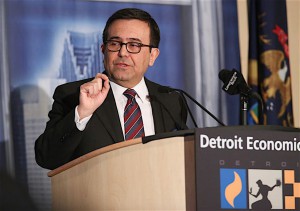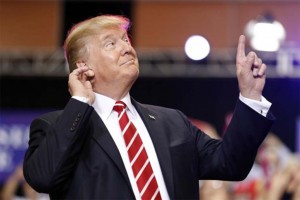
Mexican Secretary of the Economy Ildefonso Guajardo said that each country in the NAFTA talks has its "limits" and warned against rash decisions.
Top trade officials from the U.S., Canada and Mexico squabbled openly as they wrapped up the most recent round of negotiations aimed at changing the North American Free Trade Agreement, which has become a key prop for auto production in the U.S.
Representatives were openly critical of each other’s positions, acknowledging in a joint statement that “new proposals had created significant conceptual gaps” between them.
Talks are expected to resume in Mexico Nov. 17, but are not expected to be completed until sometime next year, which means they would bump into the Mexican presidential campaign. Observers have warned pushing the talks into the next year could lead to serious political problems, particularly in Mexico.
Meanwhile, automakers led by General Motors are struggling to maintain the current “rules of origin” are threatened by changes supported by the Trump administration.
(Trump negotiators’ new autos proposal may kill NAFTA talks. To see the story, Click Here.)
So far, the previous rounds of negotiations have produced little progress on the issues of greatest concern to the automotive industry, according to the Center for Automotive Research in Ann Arbor, Michigan.

Despite repeated threats, President Donald Trump hasn't instituted the procedure necessary to pull the U.S. out of NAFTA.
“The slow pace of resolving issues on the table calls into question the prospect of wrapping up negotiations by the end of the calendar year,” CAR noted.
So far, the previous rounds of negotiations produced little progress on the issues of greatest concern to the automotive industry, and this slow pace of resolving issues on the table calls into question the prospect of wrapping up negotiations by the end of the calendar year, as predicted by U.S. officials.
Rules of Origin, or ROOO, is one of the thorniest NAFTA issues for the automotive industry. Currently, NAFTA employs a 62.5% threshold for Regional Value Content (RVC) in motor vehicles and parts, which is the highest ROO of any U.S. trade agreement. The Trump administration is pushing to increase the percentage of RVC to 85%.
(Click Here for details about Trump’s warning against NAFTA talks.)
Canadian Foreign Affairs Minister Chrystia Freeland strained a smile, then stated that the U.S. had made a “series of unconventional proposals” that was threatening to “turn back the clock” on 23 years of collaboration under NAFTA.
The Canadians are still fuming over a decision by U.S. Department of Commerce imposed duties of 79.82% against Bombardier’s C-Series jets, which alleged that Bombardier engaged in product dumping in its sale of the C100 to Delta Airlines. However, Airbus, the European maker of civilian aircraft, which is basically exempt duties, has announced plans to acquire a majority stake in Bombardier.
Meanwhile, Mexican Secretary of the Economy Ildefonso Guajardo, reading his own statement, said “we all have our limits,” and warned against making decisions today that will haunt them tomorrow.
After their joint appearance in Washington, Robert Lighthizer, the top negotiator for the U.S., in a separate briefing told reporters that there has been no discussion or decision on whether the U.S. would pull out of NAFTA. His boss, President Donald Trump, has said several times that the U.S. may need to withdraw from the agreement before it could get a good deal.
(U.S. trade leader says NAFTA has “failed” Americans. Click Here to see why.)
Trump, however, has not given the required six months’ notice for withdrawal despite the tough words from U.S. trade officials.
